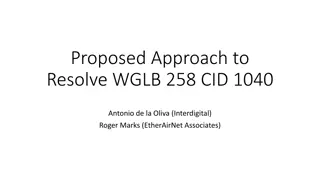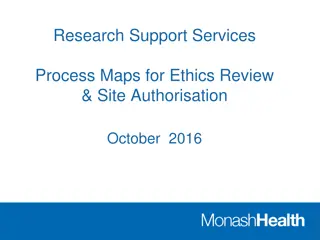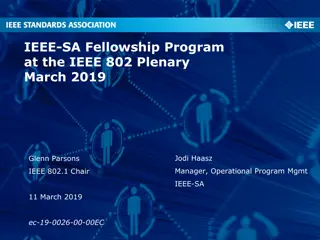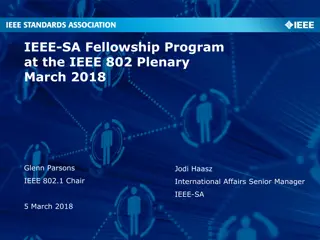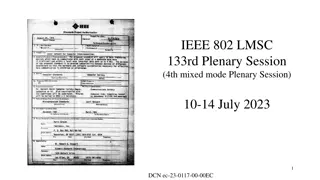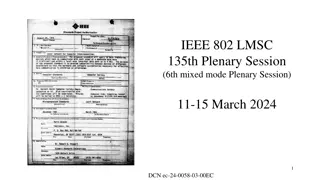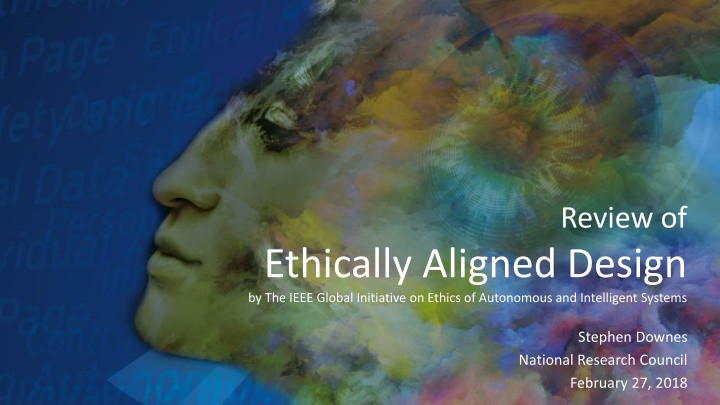
Ethically Aligned Design: Advancing Ethical Implementations for Autonomous Systems
Explore the IEEE Global Initiative on Ethics of Autonomous and Intelligent Systems' efforts to prioritize human well-being through defined values and ethical principles. Discover the purpose and process of the IEEE P7000 series in establishing ethical standards for autonomous technologies. Delve into the general principles of beneficence and human rights as they relate to the use of A/IS, emphasizing accountability, transparency, and awareness to mitigate risks and promote well-being.
Download Presentation

Please find below an Image/Link to download the presentation.
The content on the website is provided AS IS for your information and personal use only. It may not be sold, licensed, or shared on other websites without obtaining consent from the author. If you encounter any issues during the download, it is possible that the publisher has removed the file from their server.
You are allowed to download the files provided on this website for personal or commercial use, subject to the condition that they are used lawfully. All files are the property of their respective owners.
The content on the website is provided AS IS for your information and personal use only. It may not be sold, licensed, or shared on other websites without obtaining consent from the author.
E N D
Presentation Transcript
Review of Ethically Aligned Design by The IEEE Global Initiative on Ethics of Autonomous and Intelligent Systems Stephen Downes National Research Council February 27, 2018
What is this paper? Published by the IEEE Global Initiative on Ethics of Autonomous and Intelligent Systems Purpose: advance a public discussion about how we can establish ethical and social implementations for intelligent and autonomous systems and technologies aligning them to defined values and ethical principles prioritize human well-being in a given cultural context inspire the creation of Standards (IEEE P7000 series and beyond) facilitate the emergence of national and global policies See: http://www.downes.ca/post/67549
The Process The P7000 series was established to identify consensus on a broad range of ethical issues It s broken into a set of committees that each contribute to the report, eg: Transparency of Autonomous Processes (7001) Data Privacy Process (7002) Standard on Child and Student Data Governance (7004) Standard on Personal Data AI Agent (7006) Etc. Comments for the current report (v23) are due March 18, 2018 See: https://ethicsinaction.ieee.org/
General Principles Beneficence Embody the highest ideals of human beneficence as a superset of Human Rights. Prioritize benefits to humanity and the natural environment from the use of A/IS. Mitigate risks and negative impacts, including misuse. From Wikipedia: a concept in research ethics which states that researchers should have the welfare of the research participant as a goal of any clinical trial or other research study. https://en.wikipedia.org/wiki/Beneficence_(ethics) From SEP: The term beneficence connotes acts of mercy, kindness, and charity. It is suggestive of altruism, love, humanity, and promoting the good of others. https://plato.stanford.edu/entries/principle-beneficence/
General Principles 1. 2. 3. 4. 5. Human Rights eg. Universal Declaration of Human Rights (1947) Prioritizing Well-being eg. OECD Guidelines of Measuring Well-being Accountability Transparency Awareness of A/IS Technology Misuse eg. EU GDPR http://www.un.org/en/universal-declaration-human-rights/ http://www.oecd.org/statistics/oecd-guidelines-on-measuring-subjective-well-being-9789264191655-en.htm https://ec.europa.eu/info/law/law-topic/data-protection_en Prioritize benefits to humanity and the natural environment from the use of A/IS. Mitigate risks and negative impacts, including misuse.
Committees in EADv1 - Revised Content Embedding Values into Autonomous Systems Methodologies to Guide Ethical Research and Design Safety and Beneficence of Artificial General Intelligence Personal Data and Individual Access Control Reframing Autonomous Weapons Systems Economics/Humanitarian Ussies Law
New Committees in EADv2 Affective Computing Policy Classical Ethics in A/IS Mixed Reality in ICT Well-Being
Classical Ethics in A/IS Draws from both philosophical and religious traditions, eg. Secular traditions, such as utilitarian ism, virtue ethics, deontological ethics Religious and culture-based such as Buddhism, Confucianism, Ubuntu, Shinto Critiques concepts such as good and evil, right and wrong, virtue and vice Review philosophical foundations that define autonomy and ontology Can there be autonomous systems? Can there be amoral systems? Address notions such as responsibility and accountability for decisions made by autonomous systems and other AI (p. 193)
Interlude: Engineers Doing Ethics? Ethics is a specialized discipline requiring deep background As a human and social science, statistical methodology is important Do engineers constitute a significant representation of opinion? Ethics is a matter of value, not fact There is no fact of the matter There may be no consensus on ethical value It may be that ethics itself is the wrong frame to govern A/IS The discussion of ethics is presented as a series of engineering issues Is ethics reducible to a series of issues? Can it be understood as a application of principles or rules?
Foundations Establishing foundations for morality, autonomy, intelligence Three traditional economic divisions: individual, family, society Questioning the disconnection of the autonomous individual from wider society Awareness of the economic and political dimensions informing ethics Recommendations: Keep in mind that machines do not comprehend the moral or legal rules they follow Expand the definition of ethics to include the classical foundations of economy (p.195) My comments Both of these recommendations can be contested Why economics and politics? Why not physics or biology? Or astrology?
Agents and Patients Ie., the distinction between moral agents and moral subjects Distinction between natural self-organizing system Especially with respect to genetic algorithms and evolutionary strategies Vs artificial, non-self-organizing devices Autonomy in machines defines how they act and operate independently in certain contexts in some cases manifest(s) seemingly ethical and moral decisions, resulting for all intents and purposes in efficient and agreeable moral outcomes human traditions, on the other hand (manifests) as fundamentalism under the guise of morality (p. 196) John Stuart Mill s ethics provides a detailed and informed foundation for defining autonomy
Agents and Patients (2) Recommendations Recommended that the discussion first consider free will, civil liberty, and society from a Millian perspective Comments I am not convinced that the division between machine agents and subjects is as clearly defined as suggested here In particular, even advanced algorithms are designed with objectives and background assumptions I am concerned that the distinction cleaves the responsibilityfor an AI s actions from the designer and places it on the machines From an ethical perspective, therefore, so long as machines are designed and owned, they are not moral agents in and of themselves
Vocabulary Not everyone has the education and background to understand philosophical ethical terminology But philosophical theories are still useful Recommendation Support groups raising awareness for social and ethics committees Have philosophy scholars and ethicists present in no n-philosophy courses for A/IS technologists
Presenting Ethics to the Creators of A/IS Can classical ethics be used to produce meta-level orientations to data collection and data use in decision-making? Key is to embed ethics into engineering in a way that does not make ethics a servant, but instead a partner in the process a.k.a ethics-in-practice Provide students with job aids & interatively increase complexity Goal is to provide students a means to use ethics in a manner analogous to how they are being taught to use engineering principles and tools. Comment Can ethics be represented as principles or tools? Would engineers comprehend the moral or legal rules they follow?
Maintaining Human Autonomy Specifically: the possibility of autonomous systems imitating, influencing, and then determining the norms of human autonomy Negation of independent human thinking Machine s definition of who we are prevails Example: Google s autocomplete tool informs search patterns; search patterns used to define demographic categories Example: use of person s bio-information to support targeted advertising Ultimately the behavior of algorithms rests solely in their design, and that design rests solely in the hands of those who designed them. (p. 213) Does the machine work for someone in particular? Or for particular groups? Recommendations An ethics by design methodology, and a pointed and widely applied education curriculum
Maintaining Human Autonomy Specifically: the possibility of autonomous systems imitating, influencing, and then determining the norms of human autonomy Negation of independent human thinking Machine s definition of who we are prevails Examples: Google s autocomplete informs search patterns, these then used to define demographic categories, or use of person s bio-information to support targeted advertising Ultimately the behavior of algorithms rests solely in their design, and that design rests solely in the hands of those who designed them. (p. 213) Does the machine work for someone in particular? Or for particular groups? Recommendations An ethics by design methodology, and a pointed and widely applied education curriculum
Rule-Based Ethics in Programming Deontological and teleological ethics that are best suited to simple moral machines In deontology, duty is the point of departure Duty can be translated into rules For example, Thou shalt not lie For example, Kant s categorical imperative Machines can follow simple rules Inference engines are used to deduce new rules where necessary These machines, though, work only in closed-world scenarios In teleological models, the consequences of an action are assessed
Personal Data & Individual Access Control Automated and intelligent systems require data to support learning and decision-making, and this is often personal data (a.k.a. PII) Ethical considerations (p. 83): What rights do people have to prevent information form being shared? Individuals lack clarity about how to access, organize and share their own data There s a need to prioritize and include individuals in the data processes The right to have and provide informed consent Essential need to enable individuals to curate their identities and manage the ethical implications of their data Need to enable voluntary, rather than required, data collection from customers and citizens
Personal Data & Individual Access Control Automated and intelligent systems require data to support learning and decision-making, and this is often personal data (a.k.a. PII) Ethical considerations (p. 83): What rights do people have to prevent information form being shared? Individuals lack clarity about how to access, organize and share their own data There s a need to prioritize and include individuals in the data processes The right to have and provide informed consent Essential need to enable individuals to curate their identities and manage the ethical implications of their data Need to enable voluntary, rather than required, data collection from customers and citizens
Personal Data Themes Digital Personas Regional Jurisdiction Agency and Control Transparency and Access Symmetry and Consent P7002, Data Privacy Process P7004, Standard on Child and Student Data Governance P7005, Standard on Employer Data Governance P7006, Standard for Personal Data Artificial Intelligence (AI) Agent These again are subdivided into issues
Digital Personas Digital identities and personals function differently in real and digital life Behaviours considered a norm in real life and not so in digital life & vice versa Eg. consider how we would use companion robots, autonomous vehicles Recommendations: policies, protections, and practices must provide all individuals the same agency and control over their digital personas and identity they exercise in their realworld iterations. Individuals should have access to trusted identity verification services to validate, prove, and support the context-specific use of their identity. This includes data-verification services in sectors such as banking, government, telecommunications
Stephen Downes National Research Council Canada http://www.downes.ca https://www.nrc-cnrc.gc.ca/

